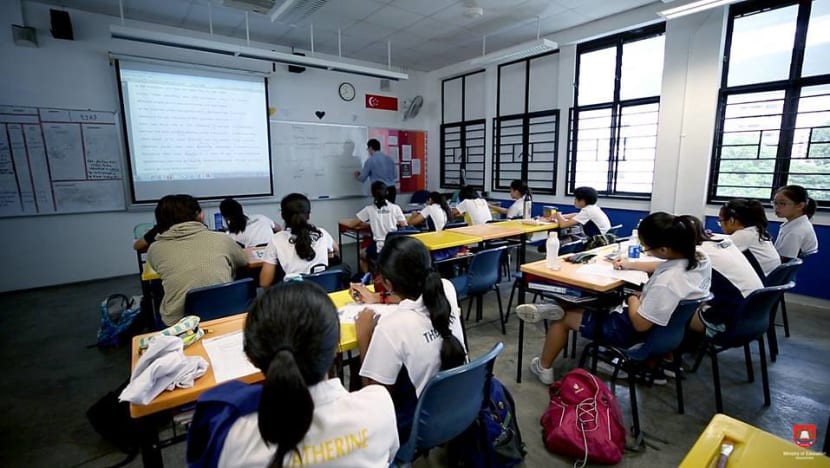Current approach to streaming in secondary schools to be phased out by 2024
The N- and O-Level examinations will be replaced by a new common national examination and certification framework, the Minister for Education announced in Parliament on Tuesday (Mar 5).

Secondary school students in a classroom in Singapore. (File photo: MOE)
SINGAPORE: By 2024, streaming in secondary schools will be replaced by subject-based banding, and following that, the O-Level and N-Level examinations will be combined into one common national examination.
Subject-based banding, or SBB, will replace the existing system of streaming students into Express, Normal (Academic) or Normal (Technical) based on their PSLE results, Education Minister Ong Ye Kung announced on Tuesday (Mar 5).
Under the new system, students will take subjects at different levels according to their abilities.
READ: Government to end current system of secondary school streaming: What you need to know
Students entering Secondary 1 in 2024 – this year’s Primary 2 cohort – will be the first full batch of students to be banded according to subjects.
Upon entering Secondary 1, they will take a combination of subjects at three different levels based on their PSLE scores: General 1, General 2 and General 3. These three levels are mapped from the current Normal (Technical), Normal (Academic) and Express standards respectively.
The system is similar to how students taking the A-Levels offer subjects at H1, H2 and H3 levels, and how PSLE students take subjects at Standard or Foundation level, MOE said.
About 25 schools will implement full subject-based banding from next year, with more schools joining in the subsequent years.
READ: Junior college campuses to be rebuilt, upgraded from 2022: Ong Ye Kung
Speaking during his ministry’s Committee of Supply debate, Mr Ong said that streaming, which was implemented more than three decades ago, has successfully reduced school attrition rates from about a third of every cohort to less than 1 per cent currently. But he also noted that there are downsides to streaming.
“In its original form, streaming assumed that students needed a certain pace of learning in all their subjects, whereas many students, in fact, have uneven strengths across different subjects,” he said.
“More importantly, entering a stream that is considered ‘lower’ can carry a certain stigma that becomes self-fulfilling and self-limiting,” he added. “Students can develop a mindset where they tell themselves, ‘I am only a Normal stream student, so this is as good as I can be.’”
Subject-based banding will allow lower secondary school students to study more subjects at a higher level – not just English, mother tongue languages, maths and science, but also others, such as geography, history and literature, Mr Ong said.
“As it may be difficult to ascertain the level suitable for students using just their PSLE results, MOE and schools will develop guidelines and assessment mechanisms, including using Secondary 1 year-end examinations,” he added.
The system was first tested in 12 secondary schools in 2014. At the time, students posted to the Normal (Academic) and Normal (Technical) streams could take English, mathematics, science or mother tongue languages at a higher level from Secondary 1, if they performed well in these subjects at the PSLE.
This was later rolled out to all secondary schools in 2018.
READ: Government needs to recognise trade-off that comes from streaming students in secondary school: Ong Ye Kung
According to MOE, about 60 per cent of Secondary 1 students in the Normal (Technical) stream and 40 per cent of students in the Normal (Academic) stream took subjects at a higher level.
The results of those students show that Normal and Express stream students perform comparably in the O-Level exams, Mr Ong said. For example, 25 per cent of Secondary 4 Normal (Academic) students who took O-Level English got an A1 or A2, compared to 24 per cent for Express students.
“The Normal stream students have held their own, and our surveys also showed that students, parents and teachers overwhelmingly welcome it,” he said.
“We are now ready to take a further, major move."
ONE COMMON NATIONAL EXAM TO REPLACE N-, O-LEVELS
The GCE N- and O-Level examinations will be consolidated into a new common national examination and certification framework. Students will receive a single national certification which reflects the level at which each subject is taken.
The new national examination and certification framework will take effect in 2027, when the 2024 Secondary 1 cohort reaches Secondary 4.
Mr Ong said that this will reflect the reality of subject-based banding as a more flexible, single course. Singapore and Cambridge, he said, will co-brand this new certificate, as both are “strong international brand names in education”, which will “enhance the recognition and value of the certificate".
However, even though the streams will be merged, Mr Ong said that students will continue to be posted to secondary school via three PSLE scoring bands.
“Educationally, this approach is both practical and reasonable and sound, because the transition from Primary 6 to Secondary 1 is a very major one, and a significant one for all students, and we need students to start off well,” he said, adding that the PSLE still serves as a “useful initial gauge” of the subject bands that each student is most suited for at the beginning of Secondary 1.
This means that students admitted in the first PSLE scoring band will initially take most subjects at G1 level, those in the second band will take most subjects at G2 level, and those in the third, G3.
“Admitting students across three PSLE score bands will allow schools to offer subjects of all bands,” he said. “But once in secondary school, students can discover and further develop their strengths and interests, and full SBB will enable them to diverge into various paths, taking a combination of subjects across different bands.”
READ: Scope for specialised secondary schools to offer more subject options amid streaming changes
MOE TO ALSO REVIEW POST-SECONDARY POSTING SYSTEM
In his speech, Mr Ong also addressed the question of whether Secondary 5 will remain, pointing out that this is a “key concern” amongst students and parents, as attaining the O-Levels through Secondary 5 helps students in the Normal (Academic) stream access polytechnics and junior colleges.
He said that MOE’s plan is that all students enrolling into Secondary 1 will go through a four-year curriculum, for all subject bands.
“These students will attain the common certificate with various permutations – some will have six G3 subjects and one G2 subject, Some will have five G3s and two G2s, Others may have two G3, three G2 and one G1, and so on,” he said.
This, he said, will require MOE to review the existing post-secondary posting system, so students taking a combination of G1, G2 and G3 subjects can be fairly considered for ITE, polytechnics and JCs.
He added that MOE will also explore other alternatives to a fifth year in secondary schools.
SCHOOLS CAN RESHAPE SOCIAL ENVIRONMENT TO BENEFIT STUDENTS
Beyond academic aspects, Mr Ong added that the new system would give schools the opportunity to reshape the social environment to benefit their students. He cited examples of schools such as Boon Lay Secondary, which organises its form classes by Co-Curricular Activities, and Edgefield Secondary, which has reorganised its form classes to include students from all three streams.
“With full SBB implemented, form classes reorganised across the board and a common secondary education certificate, we would have effectively merged Express, Normal (Academic) and Normal (Technical) streams into a single course,” he added. “The Express, Normal (Academic) and Normal (Technical) streams, together with their labels, will be phased out.
“So from three education streams, we will now have ‘one secondary education, many subject bands’," he said.
“We will no longer have fishes swimming down three separate streams, but we have one broad river, each fish negotiating its own journey.”














